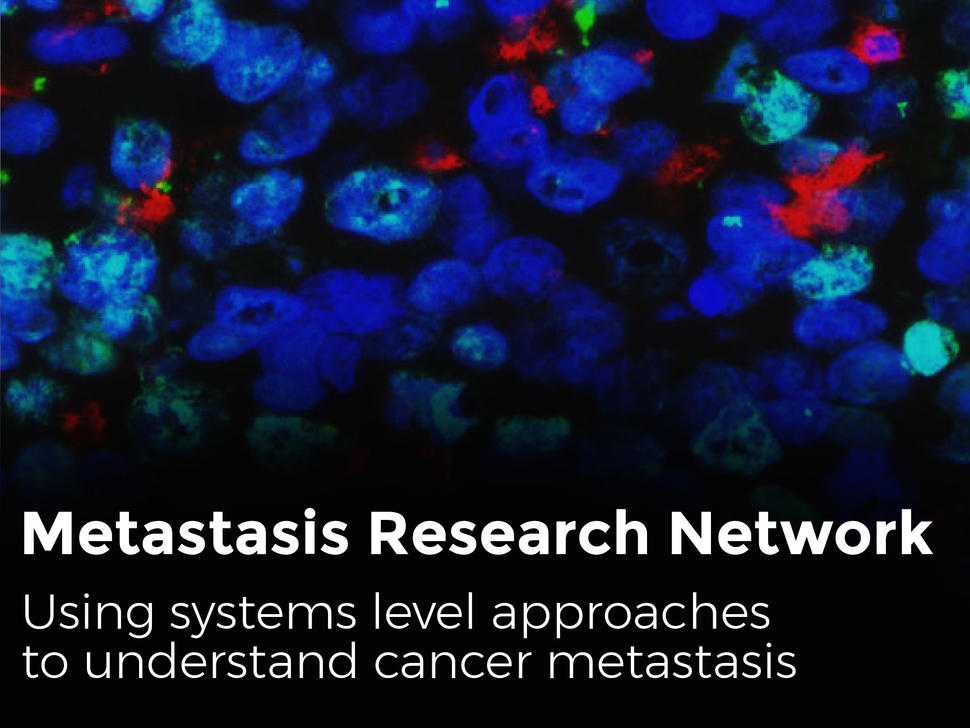MetNet Funding Opportunity
PAR-22-234: MetNet Research Projects (U01 Clinical Trial Not Allowed)
MetNet Research Advocates
MetNet brings together scientific experts in different disease and research areas to find answers to why and how metastasis occurs in cancer and discover solutions to prevent, control and ultimately eradicate it. Patient advocates bring a unique perspective to each MetNet center, working as valued partners with the researchers. They incorporate the patient experience into basic and translational research, having experienced cancer or having supported someone with cancer.
The advocates have three primary roles:
- Engage in a scientific discussion with the investigators to communicate patient priorities, preferences, and concerns.
- Mentor researchers to broaden their understanding of the disease, help them communicate their work in a way that is accessible for those outside the scientific community, and gain perspective on the impact they have on patients’ lives.
- Serve as a liaison to their communities by translating the progress of scientific research from MetNet for a general audience.
The research advocates are each a member of one of the five MetNet academic institutions’ centers, and they also work together on common advocacy goals across the centers.
MetNet News and Publications
MetNet News
Diane Heditsian (a MetNet Research Advocate and breast cancer survivor) highlights the importance of integrating the patient perspective into cancer research and shares her work mentoring early career cancer researchers, including helping them learn how to communicate their science to broad audiences, in a Stanford Cancer Institute news article.
Publication Highlights
- Researchers with the Rockefeller University MetNet Center revealed that tumor-induced hyperactivation of sensory neurons regulates multiple aspects of breast cancer metastasis. According to Veena Padmanaban (first author of the study), “This is an exciting discovery—no one has seen peripheral nerves release a signal to enhance metastasis before.” Additionally, the findings showed that targeting this neuro–cancer signaling axis with aprepitant (an FDA approved anti-nausea drug) suppressed breast cancer growth and metastasis in preclinical models.
- By analyzing sequencing data and using computational approaches, Houlahan et al. with the Stanford Breast Metastasis MetNet Center found that germline-mediated immunoediting shapes breast cancer subtypes and metastatic potential. When describing the research, Dr. Christina Curtis (lead investigator of the study) said, “We find that the path to tumor development is constrained by hereditary factors and immunity. This new result unearths a new class of biomarkers to forecast tumor progression and an entirely new way of understanding breast cancer origins.”
- Researchers with the MIT MetNet Center discussed how biophysical adaptations in the primary tumor microenvironment continue to promote metastasis via cellular mechanical memory.
Upcoming and Past Meetings
October 20 - 23, 2024 - MetNet Investigators Annual Meeting (Joint with the Cancer Systems Biology Consortium)
October 11 - 12, 2023 - MetNet Investigators Annual Meeting
October 17 - 18, 2022 - MetNet Investigators Annual Meeting
December 2, 2021 - MetNet Kickoff Meeting
September 24, 2021 - MetNet Center Introductions
Contacts for MetNet
For additional information about the MetNet, please contact Dr. Joanna Watson, Dr. Christine Nadeau, or Dr. Brunilde Gril.
Funded Projects
MetNet Research Centers (U54s)
| Institution | Principal Investigator(s) | Project Title |
|---|---|---|
| Stanford University | Christina Curtis | Evolutionary dynamics and microenvironmental determinants of metastatic breast cancer |
| Massachusetts Institute of Technology | Roger Kamm, Vivek Shenoy | Mechanical determinants of organ-selective metastatic colonization, dormancy, and outgrowth |
| Stanford University | Melanie Hayden Gephart | Deconvolution and interruption of the cancer-neuro-immune axis facilitating brain metastases |
| Rockefeller University | Sohail Tavazoie | Center for systems-level study of metastasis |
| New York University School of Medicine | Eva Hernando, Iman Osman | NYULH Metastasis Research Network Center (NYULH MetNet Center) |
MetNet Research Projects (U01s)
| Institution | Principal Investigator(s) | Project Title |
|---|---|---|
| Albert Einstein College of Medicine | Julio Aguirre-Ghiso, Brian D. Brown, Maria Sosa | Investigating disseminated cancer cell clonal cooperation and immune control in dormancy and metastasis |
| Johns Hopkins University | Andrew J. Ewald | Mapping the single cell state basis of metastasis in space and time |
| University of Texas Health Science Center | Tim H.M. Huang | The role of tumor-macrophage hybrid cells in prostate cancer metastasis |
| University of Washington | Andrew A. Oberst, Mark B. Headley | Promotion of metastasis by apoptotic cells |
| Washington University in St. Louis | David G. DeNardo, Li Ding, Ryan C. Fields | The impact of metastatic site on dendritic cell-driven tumor immunity |
